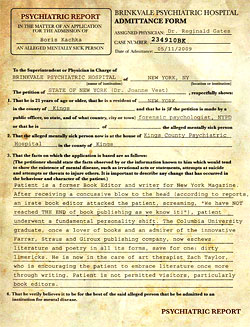
Even those of us on the less glamorous end of the culture beat — books — are subject to an amusing marketing gimmick from time to time. There was the free goldfish we got a few years ago with a chick-lit novel whose name we can’t recall (the fish lived for weeks under the intermittent care of the research department; if we had only stuck to the feeding schedule — and remembered about the weekends). But everyone knows the best marketing is targeted — so long as it never quite crosses the line into plain creepiness.
Walking that fine line is the savvy press campaign dreamed up to promote St.
Martins Press’s Personal Effects: Dark Art, for which seven lucky journalists have received personalized fictional “Psychiatric Reports,” a prescription bottle full of “Metuonox” made out in their names (actually M&Ms), and personalized hospital bracelets along with their galleys.
Dark Art, out this week, is the first book in a possible series of interactive thrillers by J.C. Hutchins and Jordan Weisman. With a pocket full of “evidence” enfolded into the front cover and a plot riddled with phone numbers and URLs to visit along the way to the big reveal, it is itself a marketing trick, a would-be Blair Witch Project for the Twitter age. The authors also celebrated the release of the book with an “online launch party.” (Weisman is a game designer, Hutchins the author of a podcast trilogy.)
Most important, of course, the publisher has to get your attention — but before that, they have to get ours. But is strenuous Googling of critics’ names the best way to accomplish that? Sure, it’s fun — and even a little creepy — to read about an alternate universe in which we were clobbered by someone over a feature we wrote a year ago, and now suffer from nyctophobia (fear of the dark) as a result. The book itself is a fun experience, well executed. And we do like M&Ms. But we’re also left with the uneasy feeling one gets when buttonholed by a self-promoting stranger who repeats your first name twenty times during a five-minute conversation, interspersing references to your favorite books — tactics that are probably underlined in his well-worn copy of How to Win Friends and Influence People.





